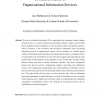Free Online Productivity Tools
i2Speak
i2Symbol
i2OCR
iTex2Img
iWeb2Print
iWeb2Shot
i2Type
iPdf2Split
iPdf2Merge
i2Bopomofo
i2Arabic
i2Style
i2Image
i2PDF
iLatex2Rtf
Sci2ools
JITECH
2008
2008
Towards a theory of organizational information services
: The use of information technology (IT) in organizations has undergone dramatic changes the past 30 years. As a result, it has become increasingly common to adopt a services rather than a traditional systems perspective to more accurately capture contemporary practices. There is, however, a lack of theories that can help us understand, assess, and design information services in organizational contexts. On this backdrop, we combine general notions of information processing options and requirements to outline a contingency theory of organizational use of information services. The theory suggests that organizational actors evoke subsets of heterogeneous service portfolios as they execute tasks and that evoking different subsets may lead to equally satisfactory outcomes. The theory distinguishes between four types of services: computational, adaptive, networking, and collaborative services, and it suggests that organizational actors need portfolios of information services that are suited ...
| Added | 13 Dec 2010 |
| Updated | 13 Dec 2010 |
| Type | Journal |
| Year | 2008 |
| Where | JITECH |
| Authors | Lars Mathiassen, Carsten Sørensen |
Comments (0)

